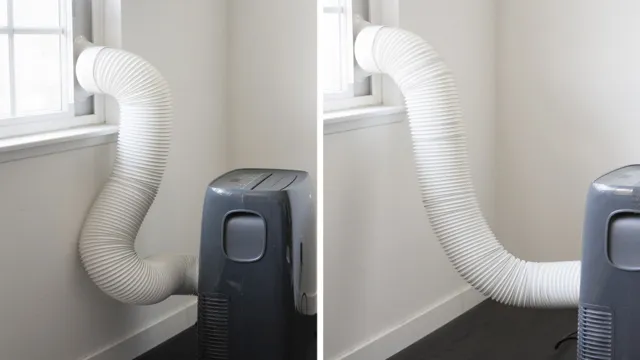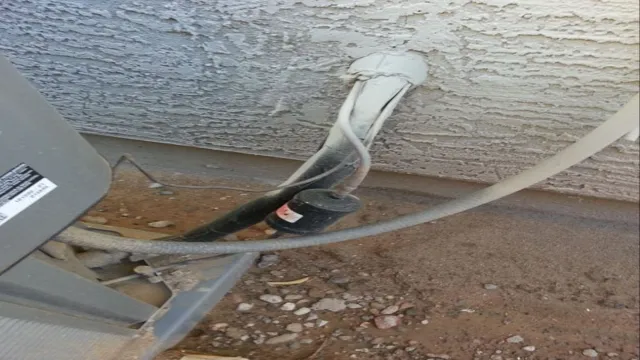Do you feel like your AC is taking forever to cool down your home? If so, you’re not alone. Nothing is more frustrating than sitting in a sweltering home on a hot summer day, desperately waiting for your air conditioner to do its job. The good news is that there are a few simple troubleshooting steps you can take to improve your AC’s cooling time.
In this blog post, we’ll explore some of the most common reasons why your air conditioner might be struggling to cool your home, and offer some tips for getting your AC system back on track. So sit back, relax, and let’s get to the bottom of this cooling conundrum.
Check for Blockages
If you’ve noticed that your AC is taking a long time to cool your home, there are a few things you can check for before calling in a professional. One of the most common culprits is a blockage in the air conditioning system. Over time, debris such as dirt, dust, and even mold can accumulate inside the air ducts and filters, reducing the airflow and making it more difficult for your AC to cool your space efficiently.
You can try cleaning or replacing the air filters to see if that improves the situation. If you’re handy, you can also try checking the air ducts for any blockages or obstructions that may be impeding the airflow. However, if you don’t feel confident doing this yourself, it’s always best to seek out a professional HVAC technician to ensure that the blockage is safely and effectively removed.
By addressing any blockages in your AC system, you may be able to restore it to its former efficiency and enjoy a cool, comfortable home once again.
Clean Air Filters and Vents
Air filters and vents are an essential component of a functional HVAC system. Regular maintenance of these filters and vents is crucial to ensure that the air circulating around your home is clean and safe to breathe. It’s important to check for blockages regularly, as debris and dust can build up in these areas, reducing the efficiency of your system and increasing the risk of respiratory problems.
A clogged filter or vent can also result in reduced airflow, which can cause your HVAC system to work harder and use more energy to circulate the air. Think of your air filters and vents as the lungs of your home. Just like we need our lungs to be clean and functioning properly, your HVAC system needs clean filters and vents to work efficiently.
By checking for blockages and replacing dirty filters regularly, you can prolong the life of your HVAC system and improve the air quality in your home.

Inspect Ducts for Obstructions
If you’re experiencing poor airflow or a noticeable decrease in your HVAC system’s efficiency, there’s a good chance that your ducts could be obstructed. A simple way to check for blockages is to inspect your ducts visually. Begin by removing the registers from the grills and looking into the ducts with a flashlight.
If you notice any debris, such as dust or lint, use a vacuum to remove it. Be sure to check all the ducts in your home, especially those that may be hard to reach, such as those in the attic or crawl space. If you’re still experiencing airflow problems after inspecting your ducts, it may be time to call a professional HVAC technician to help diagnose the issue.
By keeping your ducts free of blockages, you can help ensure that your HVAC system runs smoothly and efficiently, providing you with optimal comfort all year round.
Thermostat Issues
If you’ve noticed that your AC is taking a long time to cool down your home, there could be a variety of issues at play. One common culprit is the thermostat. If your thermostat is not calibrated properly, it may be causing your AC to run longer than necessary and fail to meet your temperature preferences.
Another issue may be that your thermostat is located in a spot that is not representative of your home’s average temperature, causing it to inaccurately measure the temperature and adjust your AC accordingly. It’s also possible that your thermostat is outdated and cannot communicate properly with your AC unit. If you’re experiencing thermostat issues, it’s best to call in a professional to assess the situation and make any necessary repairs or replacements.
However, it’s always a good idea to regularly maintain and test your thermostat to prevent any future issues. By taking these steps, you can ensure that your AC is running efficiently and effectively, keeping your home cool and comfortable.
Ensure Proper Thermostat Programming
One common issue that homeowners encounter with their HVAC system is a malfunctioning thermostat. This small device serves as the control center for your heating and cooling system, and it is essential for maintaining comfortable indoor temperatures and saving energy. One of the most important things you can do to ensure proper thermostat functioning is to program it correctly.
This means setting appropriate temperature settings based on your household’s daily schedule and adjusting them for any changes in routine, such as vacations or holidays. Additionally, it is important to change the batteries in your thermostat regularly and keep it clean and free from dust and debris to prevent inaccurate readouts. By keeping up with proper thermostat programming and maintenance, you can avoid costly repair bills and enjoy a comfortable living environment year-round.
Check for Faulty Thermostat
If your home temperature isn’t matching the settings on your thermostat, it’s likely that the thermostat is malfunctioning. A faulty thermostat can cause many problems, from a room that’s too hot or too cold to an increase in your energy bills. One way to check if your thermostat is the issue is to test it with a thermometer.
Place the thermometer next to the thermostat for at least five minutes to compare the readings. If there is a significant difference between the two, then it’s time to replace the thermostat. Additionally, if your thermostat has outdated wiring or loose connections, it can also affect its accuracy.
It’s important to call an HVAC professional if you suspect there are deeper issues with your thermostat’s wiring. Overall, taking a closer look at your thermostat can help ensure that it’s functioning correctly, and save you time, money, and hassle in the long run.
Refrigerant Levels
If your AC unit is taking longer than usual to cool your home, it might be because the refrigerant levels are low. Refrigerant is an essential component of your AC system, and a low level can cause problems such as reduced cooling capacity, increased energy usage, and potential damage to your compressor. If you notice any signs of reduced cooling performance, such as warm air blowing out of your vents, then it’s important to get your refrigerant levels checked by a professional HVAC technician.
They can ensure that your unit is properly charged with refrigerant and fix any leaks or issues that might be causing the low levels. Neglecting this issue can cause your AC unit to work harder and become less efficient, leading to higher energy bills and potential breakdowns in the future. So, if you suspect a refrigerant issue, don’t hesitate to schedule a service appointment with a trusted HVAC professional.
Diagnostic Tests on Refrigerant Levels
Refrigerant levels are crucial to the performance and efficiency of your HVAC system. Low refrigerant levels can lead to poor cooling, increased energy bills, and other issues. Therefore, it’s essential to have your refrigerant levels checked regularly by a professional HVAC technician.
The diagnostic tests used to measure refrigerant levels include pressure tests and temperature tests. By using specialized equipment, the technician can determine the precise level of refrigerant in your system and identify any potential leaks. If your refrigerant levels are low, the technician will need to add more refrigerant to ensure your system is functioning optimally.
It’s important to note that refrigerant is a regulated substance and requires proper handling and disposal. By entrusting a qualified professional with these tests, you can rest assured that your system is in good hands and that any necessary repairs or maintenance are being performed safely and efficiently.
Refill Refrigerant if Necessary
When it comes to maintaining your air conditioning system, checking and ensuring proper refrigerant levels is crucial in keeping it functioning properly. Refrigerant serves as the cooling agent in your AC, and insufficient levels can lead to reduced efficiency and even damage to your compressor. Checking the refrigerant levels on a regular basis is key to catching any potential issues early on, but if you notice that the air coming from your AC isn’t as cool as it should be, it may be time to refill the refrigerant.
Working with a certified technician is important, as over-filling or under-filling can cause further damage. By keeping your refrigerant levels at the appropriate level, you’re not only keeping your AC functioning properly, but also extending the life of your system. Don’t let a simple maintenance task turn into costly repairs – stay on top of your refrigerant levels and enjoy a cool, comfortable home.
Professional Maintenance
If you’re experiencing the frustrating issue of your AC taking a long time to cool your home, it may be time for some professional maintenance. There are a few reasons why your AC could be struggling to keep up with demand, such as a dirty air filter, low refrigerant levels, or a malfunctioning compressor. By scheduling routine maintenance with a professional HVAC technician, you can catch these issues before they become major problems and extend the lifespan of your AC unit.
Not only will this save you money in the long run, but it will also improve the overall comfort and efficiency of your home. So if you’re tired of waiting for your AC to catch up, don’t hesitate to call in the pros for some expert maintenance.
Conclusion
Well, it seems like your AC is taking its sweet time, almost as if it’s on island time. Perhaps it’s in need of a recharge, or maybe it’s just enjoying the chill vibes of summer a little too much. Either way, be patient and give it time to do its job.
After all, good things come to those who wait (and sweat a little in the meantime). “
FAQs
Why is my AC taking so long to cool my room?
There could be several reasons for this, including dirty air filters, low refrigerant levels, or a malfunctioning compressor. It’s best to have a professional technician diagnose and fix the issue.
How often should I clean or replace my AC’s air filters?
It’s recommended to clean or replace air filters every 1-3 months, depending on usage and the type of filter your AC uses. Clogged or dirty filters can decrease efficiency and cause longer cooling times.
Can a thermostat issue cause my AC to take longer to cool?
Yes, if the thermostat is malfunctioning, it may not accurately detect the temperature and send the right signals to your AC. This can cause your AC to take longer to reach the desired temperature.
What is the ideal temperature setting for my AC?
The ideal temperature setting for most people is around 72°F, but this can vary depending on personal preferences and the outdoor temperature. It’s important not to set the temperature too low, as this can strain your AC and increase energy consumption.

